8 Days Alone in Kyrgyzstan
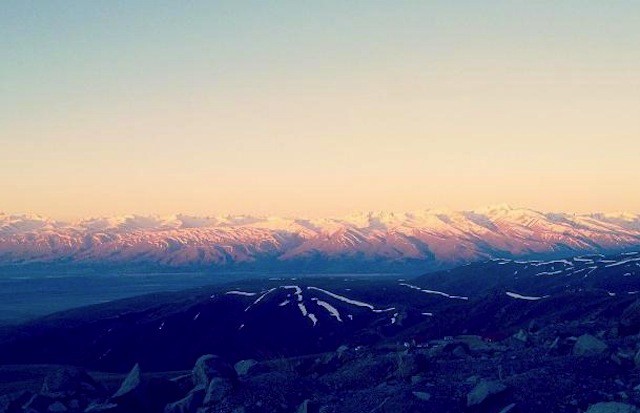
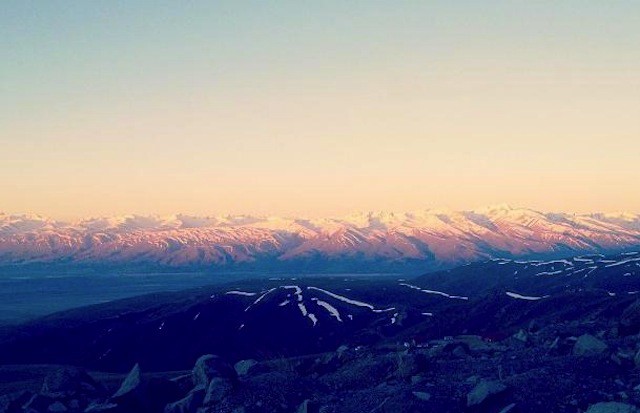
Jia Tolentino is me.
So you are doing this series now?
I would like to! Please email me if you have been traveling alone somewhere cool. And my definition of both “somewhere” and “cool” is loose, like maybe the next piece will be “2 Weeks Alone in a West Virginia Chuck-E-Cheese” or “7 Months Alone With My Terrible, Terrible Secret.”
What is a Kyrgyzstan? Is it real? How to pronounce?
It is a country in Central Asia, located west of China and south of Kazakhstan. You pronounce it Kur-giz-stan. It is wild and beautiful. See?
Why did you go there this summer?
I was a Peace Corps volunteer there in 2010 to early 2011, and I’m writing fiction about it and have stayed involved with some development work, and I just really love the country and missed it and wanted to have the luxury of experiencing it outside the context of “Here is your home for the next two years.”
Why do you like it so much?
Before I’d even gotten there, I liked that Kyrgyzstan inhabits a sort of geographic no-man’s-land. I think Central Asia is of the few remaining regions of the world that people view as foreign in an unappealing way. But it’s so appealing to me, a place that’s relatively unknown and full of super interesting intersections of culture and tradition. Kyrgyzstan is a place of fierceness and tremendous generosity, terrible violence and incredible family love, Islam and alcoholism, head scarves for married women and naked girls on European MTV. People are loyal to their thousand-year-old tribes and they’re also getting on Facebook, you can get 3G internet in the villages but there are no indoor toilets to be found. It’s the only country in the world to contain both a Russian and an American military base. Etc.
How do you get there?
From America it’s usually a two-leg flight through Moscow, London, or Istanbul — I’ve done it all three ways and like watching the plane population change according to the route. This time I flew through Istanbul, and my plane was surprisingly full of white people, including a bunch of military guys, some polo-shirt dad bros who probably worked in natural resources, and one — I fear — Coldplay cover band from England who had a full drum kit with them and sang harmonies all the way through passport control.
And you traveled there alone. Do you like traveling alone?
I love it. I did it a lot during college. If I’m counting right I’ve been to 16 foreign countries in the last seven years, none of them with my family. Being alone is really good for me — if I’m around people for too long I have a tendency to drink too much and lose my inner monologue and eventually start going haywire and slap-happy from that sort of chemical need for solitude.
But, while I was living in Kyrgyzstan, the way I was alone was so barbed and total that I lost my Intense Travel Desires for a long time afterward. So I haven’t traveled alone in a long time, and even this doesn’t really count — most of the time I was with my good friend David, who just signed up for his fourth year working for free in the village 20 minutes away from my old one.
What does a Peace Corps volunteer even do in a fourth year?
A volunteer in his or her fourth year is doing very different work than a first-year volunteer ever could — they’ve laid so much groundwork in their community, there’s very little time wasted on adjustment, they’ve made their site their real home.
David specifically: among a lot of other stuff, he’s been working with an anti-bride kidnapping organization called Youth Hope, which is amusingly located on Karl Marx Street in a town called Talas. Bride kidnapping is a huge problem in Kyrgyzstan still — it’s technically illegal but there were only 10 cases prosecuted last year (compared to 650+ cases of livestock kidnapping prosecuted), and it happens to more than 11,000 Kyrgyz women annually, and it is so deeply tied to rape and abuse and other issues. The woman that David’s helping has been working for free all year in order to keep the office open — donate! if you feel like — and they’re constantly at it, getting people to break the taboo and talk about kidnapping.
They’re also always helping other organizations. The second day I was in Kyrgyzstan, I went to a “Hip-Hope” dance fundraiser they held for a local orphanage. Seeing their work was a huge reminder of the whole “the less you have, the more you give” factor, which was always horribly humbling to see in Kyrgyzstan; exposure to need brings about this tremendous, stretched-thin generosity.
Was anything different about this trip, compared to other times you’ve traveled alone?
One big different thing was that I didn’t consume any alcohol, and ended up liking the feeling so much that I stayed sober for awhile after I got back. I hadn’t dried out for a long time, actually not since my liver was strung out on TB meds after my service. David doesn’t drink, so it was nice to remove booze from the equation, which is hard to do when you’re traveling with buddies.
But some things were exactly the same, like I devoured and then got really attached to all the books I was carrying. Over the course of the trip I read Where’d You Go Bernadette, Case Histories, The Buddha in the Attic, Wild, Decoded, Beautiful Ruins, The Yellow Birds, and May We Be Forgiven. I liked them all. Do you want to talk about them?
Maybe in the comments. Hey, what’s the food like in Kyrgyzstan?
Like this. Just kidding. Although, receiving the dreaded “animal face” meal was a common fear among volunteers, one that came to fruition a few times — the honored guest would get a blow-torched sheep face complete with eyeballs. But normally local food is plain and simple. Noodles, potatoes, sheep meat, carrots, onions in various combinations, and round loaves of fresh bread, and jams and Russian salads, and lots and lots of tea.
Do people live in y
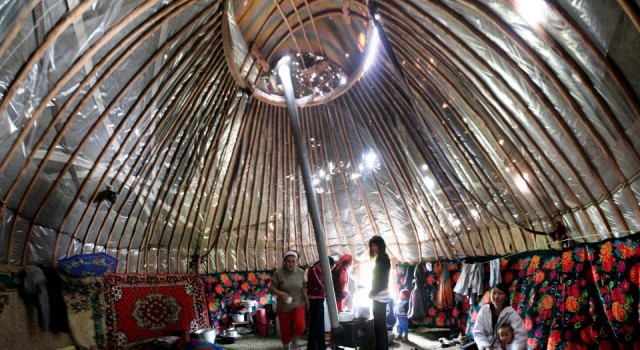
urts there?
At the jailoo, the summer pasture where there are animals roaming all around the mountains, yes — and the yurts are so gorgeous! — but in the villages, people live in little concrete houses that often have strange Germanic flourishes to them, and in the bigger towns a lot of people live in Soviet-style apartment blocks.
Did you bathe on your trip?
Twice over ten days. Once in a public bath house, full of steam and old ladies, and another time right before I left, in a bathroom in the capital city with a bucket of water I had heated up via tea kettle. The government had switched off all hot water in Bishkek for a month to save money — can you imagine if they did that in LA?
It’s unimaginable. Did you poop outside?
Almost exclusively. Spring was in full blossom when I visited and so I also got to revisit one of my old nightmares, which is Outhouse Of Bees.
I don’t mind dirty stuff in general — camping, festivals, whatever. Hygiene and amenity concerns are often what people imagine to be the primary difficulty of Peace Corps, but I think other past volunteers would agree that you get used to that stuff really fast.
What was the coolest thing you saw?
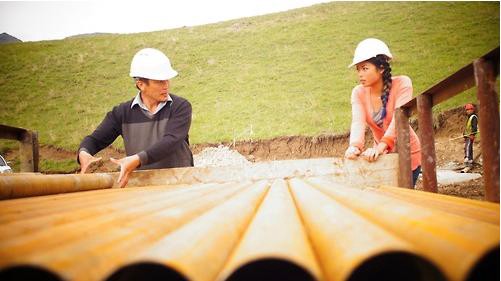
Probably the gold mine. Gold mining companies are beginning to creep up on rural Kyrgyzstan, and it’s been controversial — there’ve been protests, arson, chemical spills, actions that would suggest political bribery, and then on the other side, the companies are often very well-run and responsible for great work in the villages, like scholarships and computer labs and infrastructure improvement.
So David and I went on a tour of one of the potential mining sites for this one company, which is full of good people who believe in what they’re doing and also know that the villagers don’t want them around. I looked at this, with just a single road to a single exploratory site already cutting up the mountainside, and I wondered how long the villagers would be able to hold the company off or if they would change their minds and cave to the possibility of economic development.
How much does it cost to go to Kyrgyzstan?
I paid about $1100 for the ticket, $600 of which was covered by a research grant, and while I was in country I only spent about $350, including buying some books for my old school, buying food to make about four dinners for eight people, a night in a rented apartment, and paying for my friend David’s travel.
It’s really cheap to live there, compared to here. Like, a full-grown donkey costs $30. While I was a volunteer, I had this fantasy of just buying a hundred donkeys and becoming this pied piper American freak with a full-on donkey army.
Would someone with no previous ties to Kyrgyzstan ever have a reason to go there?
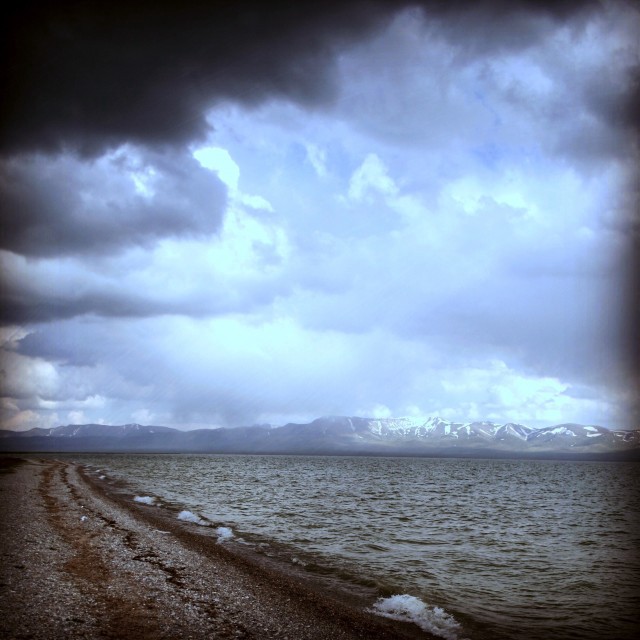
Yes! European tourists are all over it, actually. For outdoorsy people, it’s a fantastic vacation: cheap and untrodden and very, very welcoming. The landscape looks like a combination of Switzerland, Jurassic Park, and the moon, and you can get helicoptered onto glaciers in the east to take these crazy ice hikes, etc.
And there’s this one place called Lake Song-Kul that is, non-hyperbolically, the most incredible place I have ever been in my life. It is a lake at the top of this sky-high mountain where you’re basically in the clouds with horses running wild all around you and the water changing colors every second. While I was volunteering I stayed in a yurt there and I remember this black shimmery storm swept across the sky and then vanished, and the leftover mist filled with gold light as the sun set, and oh holy everything I could have laid down and died.
Would you go back to that moment if you could?
No. Travel, as with all the things I like, feels undiluted and present-tense, and of all the moments I have loved ecstatically in my life I wouldn’t want to revisit a single one.
Did you feel like two years had passed since the last time you’d been there, or did it feel like nothing had changed?
There was one moment. I was in a cab with David, and the cab driver started a conversation with us about national ideologies. He was asking us about America vs. Kyrgyzstan, telling us about Kyrgyzstan vs. other countries they’ve been in regular conflict with, and we were talking about money and discrimination and where the girls are prettiest and all that.
As a volunteer — as a tourist — my poor language skills would’ve led me to pick out the most obvious parts (“there was slavery in America! America’s full of prejudice!”) and get frustrated, but with David’s help I was able to unlock a real conversation on someone else’s terms (i.e. not just with a Kyrgyz university student who knew terrific English), and it felt like an incredible gift.
And that question — what’s the difference between Kyrgyzstan and America? — would have seemed so loaded and horrible before. But this time around it was easy to answer, and I had this wave of earnestness hit me in a really funny way. I remember trying to tell the cab driver in my stunted Kyrgyz that people everywhere are so much the same, and that I really believed it from whatever experience I’ve had from traveling — that some people are wonderful and some are terrible and some are beautiful and some are ugly and pretty much everyone is prejudiced and loving at the same time.